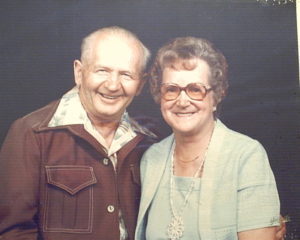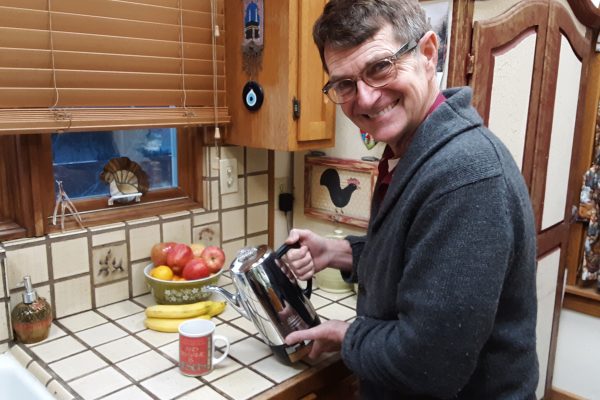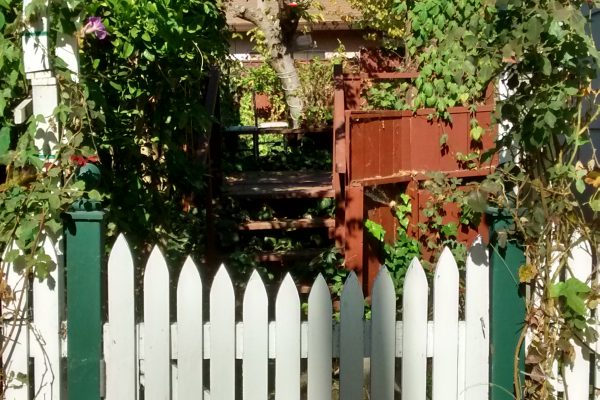By JEFF ROUBAL
Martinez News-Gazette Guest Columnist
Vivian and I were grocery shopping recently when I started grumbling about the price of bacon. “Stop complaining,” Vivian chided me, “Bacon does not grow on trees. It takes a lot of hard work.” Hearing her words, I was immediately transported back to my grandparents’ farm.
My mother was born and raised in Maine. Mom and her two younger sisters grew up in town where the family owned a filling station. When her husband died at age 39, their mother, my Nana, sold the gas station and took a job at Willards Department Store where she worked for 40 years to provide for her three young daughters.

After the girls were grown and married, Nana was courted by Andy, a local dairyman who lived on a farm with his mother. After the wedding, Nana moved in with them. My brothers and I would take turns staying at the farm during the summers when school was out. One teenager at a time was all that Nana would tolerate.
I remember many things from my time staying at the farm. The first rule was that there are no days off. Come hell or high water, the cows had to be milked twice a day, at 5 a.m. and 5 p.m. Andy never traveled because there was no way for him to take a vacation. If he was too ill to get out of bed, Nana would have to do the milking, which she did not enjoy one bit.
I can’t remember Andy ever missing a day. On the day they were married, Andy finished the 5 a.m. milking. The neighbor, who had his own dairy to run, drove over to complete Andy’s 5 p.m. milking. Andy was back the next morning in time for the 5 a.m. milking. The newlyweds did not get much of a honeymoon.
I remember being woken up at 4 a.m. to follow Andy out to the barn. It took an hour for us to sanitize everything and set up the milking equipment. At a quarter to five, the cows in the pen outside began bawling loud enough to wake the dead. We wore tall rubber boots because the ground was mucky with water and manure. We also wore heavy coats because the air was cold at 4 a.m., even in the summer. I can only imagine what it would feel like during the winter with snow piled to the eves and temperatures below zero.There were covered passages from the house to the barn for use when the snow was drifted too high to open the barn doors.
Andy had fourteen cows. Each had her own name and a personality. He warned me which ones to avoid because they might kick or step on my foot. I was awed by these lumbering beasts that weighed over a 1,000 pounds. First thing in the morning, they only wanted two things. The first was to get to the grain in their feed trough. Each cow knew which her stall was hers so all I had to do was open the door and stand back as they ambled in to start their breakfast.
The second thing the cows wanted was to get milked. Their utters were hanging heavily, uncomfortably full. I remember one cow in particular would give five gallons at each milking. The rest would give 3-4 gallons twice a day. That is a lot of weight to carry, even for a cow.
Once the milking was finished, we would turn the cows out to pasture for the day, sterilize all the equipment, and clean out the stalls. By 8 a.m., it was time for breakfast. That was a highlight of the day. Nana would get up and warm the kitchen with the wood stove. She would fry fresh picked eggs, pancakes, homegrown bacon, and make juice, coffee, and of course, milk.
After breakfast, there were always chores. Life on the farm was never dull.Andy serviced equipment, repaired facilities, and grew fields of alfalfa hay for the animals. Some of the farm buildings were constructed during the time of the American Revolution so needed a lot of maintenance. I remember that none of the stairs or walls were plumb. Everything tilted a little. The exterior walls of the two-story house and seperate barn were made of big, rough field stones bonded together with lime mortar. I have not been there in forty years but can still see the farm in my mind.
Andy had a 2,000 gallon stainless steel refrigerated tank for storing the whole milk. It used paddles inside to keep the cream from separating. Twice a week, a big refrigerated tank truck would come to take his milk to the bottling plant. One time the electricity went off at the farm. The temperature in Andy’s holding tank rose past critical so the milk had to be dumped. Nana, who never wasted anything in her life, immediately set to work churning butter. When I visited that summer, she still had 300 pounds in the freezer. We had butter on everything!
Nana kept a kitchen garden behind the house where she grew salad and vegetables. The kitchen garden was a quarter acre so there was always fruit to eat and can. They also kept chickens, hogs, and a heifer or two for meat. Back behind the kitchen garden, Andy had a smokehouse.
One time, Andy was smoking hams and the smokehouse caught on fire. A call brought the Greenwood Volunteer Fire Department from the Town of Greenwood near Oxford. The flames were quickly extinguished, followed by coffee and home-made danish from Nana. Andy was the center of much good-natured ribbing at having set his outbuilding aflame. The firemen offered to help clean up by hauling away the charred hunks of meat. Andy said that he preferred to cleanup by himself and sent the firemen down the road with many thanks.
After scraping off the burnt skin, Andy presented a ham to Nana to serve for dinner. For the rest of his life, Andy told me that those were the best hams he ever tasted! They were also the most expensive because he had to build a whole new smokehouse from the foundation up.
Knowing all that I do, I will not complain about the price of bacon (currently $7 a pound). A lot of work goes into raising the livestock, processing the meat, packaging, transporting, storing, handling, and making it easy for me. I am glad someone else wants to do this work for me. My teenage experiences and memories of farming are enough to last a lifetime.



